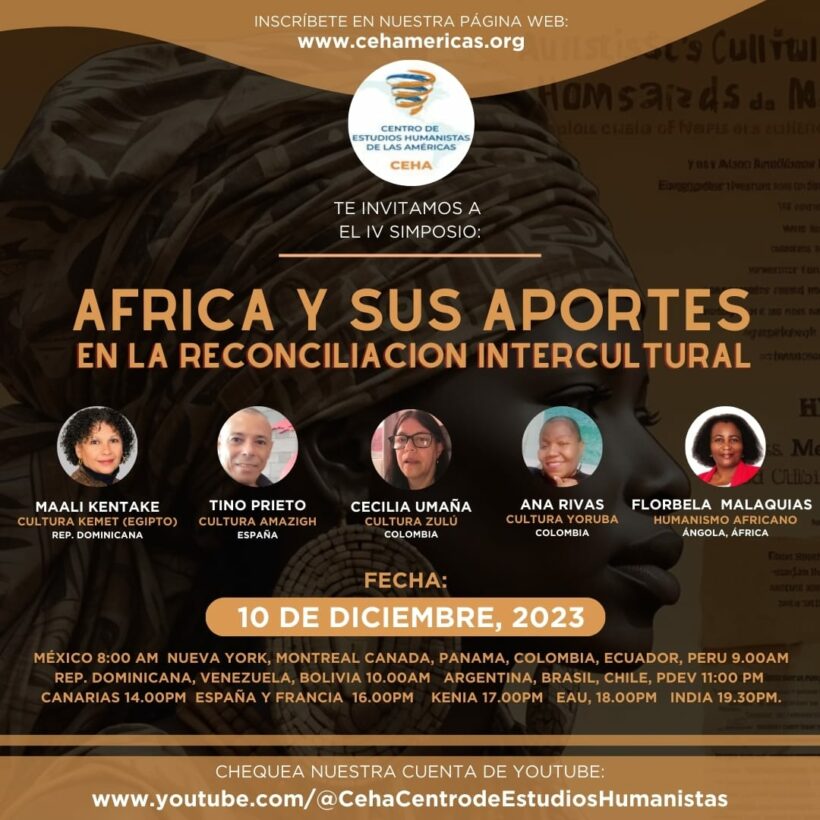This coming 10th of December, at 11:00 am. Argentina, the Centre for Humanist Studies of the Americas will hold its IV Symposium. There will be simultaneous translation in Spanish, English, and Portuguese.
Five speakers will present the African cultures of Kemet (Egypt), Zulu, Yoruba, Amazigh and African humanism.
For millennia we have been told inaccurate stories of the original Alkebulan peoples (today’s Africa), the mother of humanity. These false stories have caused a disconnect between humanity and people of African descent and with our ancestors. Today it is up to us (Afro-descendants) to tell our true stories from truth and science.
This journey will take us from ancient times to the present. We will see how many of these truths were known by those who kept them hidden from the rest of humanity for millennia. We will look at cultures at different times; the importance of science and spirituality, and their connection to nature. We will also learn about myths that speak of before creation, creation, evolution and involution, death and beyond death.
Registration is required to participate: https://www.cehamericas.org
CONTEXT OF THE DIFFERENT CULTURES
Zulu culture
The Zulu belong to the Bantu ethnic-linguistic group. Their history goes back thousands of years when a group migrated to southern Africa. Decades later all their different clans were unified under the reign of Shaka Zulu (1816-1828). Today they number more than 10 million people. A large part of them lives in Australia and the United Kingdom. Today the geographical location of the Zulu people occupies the entire region now belonging to KwaZulu-Natal and part of southern Africa, later becoming part of the Union of South Africa.
Amazigh Culture
The Amazigh people, ‘free men’, the Imazighen popularly known as Berbers, are populations of North African, Mediterranean and sub-Saharan origin. They inhabit the vast territory of North Africa, known as the
The language is a very old North African language called Tamazight or Tamaziq. The alphabets are grouped into 4 modes: Eastern Libyan or Numidic, Western Libyan or Masaesilic, Saharan or Old Tuareg, and Saharan or Recent Tuareg, called Tifinagh. The myth of Amun, of Isis and Osiris, the Bentayga rock or the cave of Fallen Crag and stop the conflicts, bring us closer to a culture whose message continues to act in all times.
Bantu Kemet Culture (Egypt)
For millennia others have told false stories of our original people of Alkebulan (now Africa), Mother of Humanity and human civilisation,” says Maali Kentake, “These false stories have caused a disconnect between Humanity and Afro-descendants and our Alkebulan ancestors. Today it is up to us (Afro-descendants) to tell our true story from Truth and Science. We share an invitation to all Humanity especially Afro-descendants to return to the Original Knowledge of our ancestors from Kemet (today Egypt) and beyond. Knowledge that gave birth to Arts, Science, Spirituality, Technology, Agriculture, Architecture, Mathematics, Astrology, Astronomy, Hydrostatics, Hydraulics, ships, navigation, flight, Nuclear Science, Medicine, etc. Also, to return the recognition, honour, dignity, respect, respect, and merit of their contributions to Humanity and Civilisation that was taken away and usurped from them. This journey will take us back to ancient times, between 236,000 to 335,000 years aea to the present.
We will see how many of these truths were known to those who kept them hidden from the rest of humanity for millennia. Cultures at different times. The importance of science and spirituality, and their connection to nature. Myths from before creation, creation, evolution and involution, death and beyond death, etc. The practice of the African concept of Ubuntu, linked with the African principle of Sankofa, will facilitate the return to ourselves and thus to the Whole in justice, union and peace.
Yoruba Culture
The Yoruba are a centenary culture that is part of a great cumulus of people who live in countries such as Niger, Nigeria, Ghana, Togo and Benin, reaching almost 30 million followers, according to registers provided by the book “Yoruba Mythology: The Sacred Heart of Africa”. Many authors – mainly African – consider that the founder of the Yoruba was Oduduwa of Arab origin. Some believe that he came from Mecca, Upper Egypt or the Nile. The Yoruba came from a kingdom located in what is now Nigeria, and their fate as slaves was later than that of other ethnic groups, dating back to the late 18th and early 19th centuries, but their culture, religion and language became dominant over that of the other slaves.










